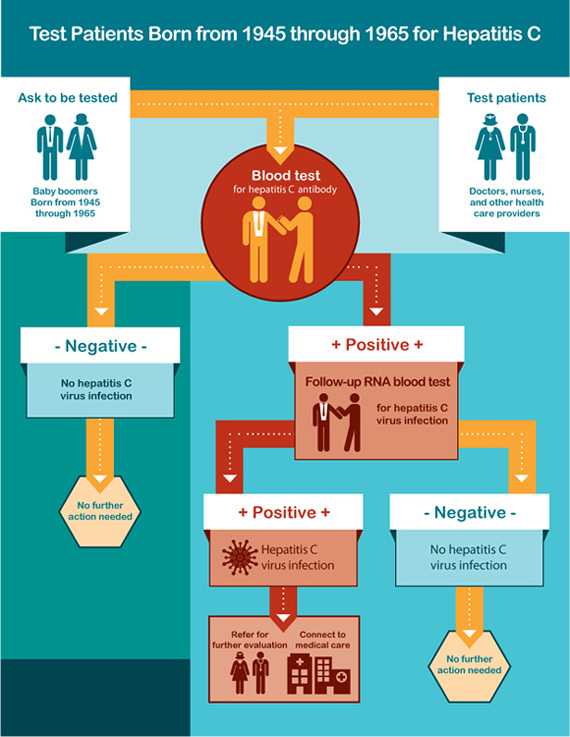Hepatitis C
Testing baby boomers saves lives
May 2013


 3 Million
3 Million
About 3 million adults in the US are infected with the hepatitis C virus, most are baby boomers.
 3 in 4
3 in 4
Up to 3 in 4 people who are infected don't know they have hepatitis C so they aren't getting the necessary medical care.
 1945-1965
1945-1965
Baby boomers, anyone born from 1945 through 1965, should get tested for hepatitis C.
Hepatitis C is a serious virus infection that over time can cause liver damage and even liver cancer. Early treatment can prevent this damage. Too many people with hepatitis C do not know they are infected, so they don't get the medical care they need.
Once infected with the hepatitis C virus, nearly 8 in 10 people remain infected for life. A simple blood test, called a hepatitis C antibody test, can tell if you have ever been infected, but cannot tell whether you are still infected. Only a different follow-up blood test can determine if you are still infected. CDC data show only half of people with a positive hepatitis C antibody test had the follow-up test reported to the health department. The other half did not have a follow-up test reported, although some of them may have been tested. Without the follow-up test, a person will not know if they still have hepatitis C and cannot get the medical care they need.
Baby boomers (people born from 1945 through 1965) can:
- Ask your doctor, nurse, or other health care provider for a hepatitis C blood test.
- Encourage family and friends born from 1945 through 1965 to get tested for hepatitis C.
Doctors, nurses and other health care providers can:
- Test all baby boomers and people with other risks for hepatitis C.
- Make sure everyone who tests positive on the first test gets the follow-up test to find out if they are still infected.
Problem
Many baby boomers got infected before the dangers of hepatitis C were well known.
Anyone can get hepatitis C, but adults born from 1945 through 1965 are 5 times more likely to have hepatitis C.
- Hepatitis C is mostly spread through contact with an infected person's blood.
- Some people could have gotten infected before widespread screening of blood began in 1992.
- People who have injected drugs, even if only once in the past, could have been infected with the virus from sharing a needle or drug equipment with someone who had hepatitis C.
- Many people do not know how or when they were infected.
Hepatitis C causes serious liver disease, even liver cancer.
- Most people with hepatitis C don't have any symptoms. If symptoms do appear, they can be a sign of serious liver damage.
- Hepatitis C can cause liver scarring and liver failure if left untreated.
- Hepatitis C is a leading cause of liver cancer.
- Successful treatment can get rid of hepatitis C from the body.
Blood tests are needed to tell if you have hepatitis C.
- A screening blood test, called an antibody test, shows if a person has ever been infected with the hepatitis C virus.
- If the antibody test is positive, a follow-up RNA blood test is needed to see if a person is still infected with the hepatitis C virus.
- A CDC study shows through health department reports that only 50% of adults who had a positive antibody test had a follow-up test reported. Without a follow-up test, people won't know if they are still infected with the hepatitis C virus.
People Who Should be Tested
- Born from 1945 through 1965
- Have received blood products with clotting factor before 1987
- Have received blood transfusion or organ transplant before July 1992
- Have ever injected drugs, even if only one time
- Have HIV
- Have been on kidney dialysis for several years
- Are health or public safety workers who have been stuck with a needle or other sharp object with blood from a person with hepatitis C or unknown hepatitis C status
- Born to mother with hepatitis C

SOURCE: CDC Recommendations 1998, 1999, and 2012
Infographic

SOURCE: CDC updated guidance, 2013
Test Patients Born from 1945 through 1965 for Hepatitis C
Baby boomers, anyone born from 1945 through 1965, should ask their health care provider to be tested for hepatitis C and all doctors, nurses, and other health care providers should test all their patients who are baby boomers for hepatitis C. Testing should be initiated with a blood test for hepatitis C antibody.
If the blood test for hepatitis C antibody is negative, then there is no hepatitis C virus infection and no further action needed.
If the blood test for hepatitis C antibody is positive, then there needs to be a follow-up RNA blood test for hepatitis c virus infection.
If the RNA is negative, then there is hepatitis C virus infection and no further action needed.
If the RNA is positive, then there is hepatitis C virus infection. Refer for further evaluation and connect to medical care.
What Can Be Done
US government is
- Working together with many federal agencies to carry out the Strategic Action Plan for Viral Hepatitis [PDF – 672KB].
- Funding programs that support hepatitis C testing and getting people linked to care and treatment.
- Educating doctors, nurses, and other health care providers about hepatitis C, developing clinical tools and issuing updated guidance to help carry out recommended testing.
- Working with states and communities to improve reporting of hepatitis C test results in order to get people needed services.
- Increasing coverage under the Affordable Care Act so more people will have health insurance for testing and treatment.
State and local public health departments can
- Let people know where they can get blood tests for hepatitis C.
- Follow-up with health care providers and laboratories for people who have a positive hepatitis C antibody test but have no record of a follow-up test.
- Monitor and report people with hepatitis C infection and promote best practices for testing and linking patients to care.
Doctors, nurses, and other health care providers can
- Set up systems to make to make sure all patients born from 1945 through 1965 are tested for hepatitis C.
- Test patients with other risks for hepatitis C, including blood transfusions before 1992 or injection drug use.
- Make sure everyone who has a positive hepatitis C antibody test gets the follow-up blood RNA test and is linked to lifesaving care and treatment if infected.
Baby boomers and all persons at risk can
- Ask their doctor, nurse, or other health care provider about getting tested for hepatitis C.
- Make sure to get a follow-up test if the antibody test is positive to see if they are still infected with the hepatitis C virus.
- To learn more about hepatitis, visit:
People living with hepatitis C can
- Eat a healthy diet, stay physically active, see a doctor on a regular basis and ask if you could benefit from new and better treatments.
- Talk to your doctor before taking over the counter medicines and avoid alcohol because they can cause liver damage.
- Reduce the risk of transmission to others by not donating blood or sharing personal items that might come into contact with blood.
Science Behind the Issue
Related Pages
- Vital Signs Issue details: Evaluation of Hepatitis C Virus Infection Testing and Reporting — Eight U.S. Sites, 2005–2011, Morbidity and Mortality Weekly Report (MMWR)
- CDC Feature- Hepatitis C: Testing Baby Boomers Saves Lives
- Vital Signs – Hepatitis C: What You Need to Know [PODCAST – 1:15 minutes]
- Vital Signs – Hepatitis C: What You Need to Know [PSA – 0:60 seconds]
- CDC: Viral Hepatitis
- Hepatitis C Information for the Public
-
HHS Action Plan for the Prevention, Care and Treatment of Viral Hepatitis
On Other Web Sites
- Page last reviewed: May 7, 2013
- Page last updated: May 7, 2013
- Content source:
- Office of the Associate Director for Communications (OADC)
- Page maintained by: Office of the Associate Director for Communications (OADC)


 ShareCompartir
ShareCompartir